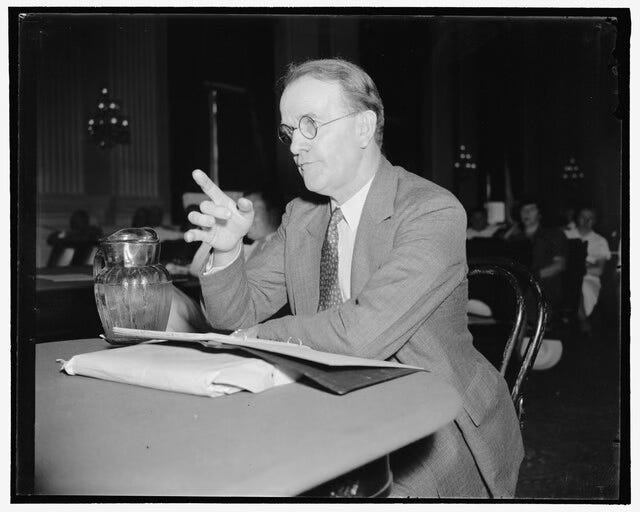In 1938, philosophy professor Edward I. Fenlon testified before the House Un-American Activities Committee that that professors and students at Brooklyn College were "deluged" daily with communist propaganda. Photo credit: Harris & Ewing/United States Library of Congress's Prints and Photographs division (Wikimedia Commons)
For years now, those of us who are paying attention have heard a range of political positions, from those held by moderate Democrats to socialism, described by MAGA Republicans as something called “the Left.” Sometimes “the Left” is simply invoked by the shorthand “they,” as in: “They tried to assassinate Donald Trump;” or more commonly, “They want you to believe,” followed by some caricature of an idea about women, race, gender, or sexuality.
But I’ve noticed something else: warnings from Republican politicians and pundits about a growing cadre of Marxists and Communists who are hostile to the United States and seek to destabilize the nation with things like “gender ideology” and “critical race theory” and “DEI.”
To the MAGA partisan, the term “Marxist” can describe anyone, from former Vice President Kamala Harris, to an anti-Israel activist, to the local librarian who steers readers to Judy Blume, to a Girl Scout troop leader who doesn’t discriminate against trans children. For example, on Saturday, June 28, 2023, presidential candidate Donald J. Trump made a pledge to the Faith and Freedom Coalition’s “Road to Majority” event in Washington D.C. that he would secure the nation’s borders against Communists and Marxists clamoring to destabilize our society.
In 1947, Screen Actors Guild President Ronald Reagan described to the House Un-American Activities Committee his success in purging massive numbers Communists from the organization. However, there had never been more than 100,000 CPUSA members, and in 1947, as Maurice Isserman’s Reds: The Tragedy of American Communism (Basic Books, 2024) explains, the party was already in trouble, a fracturing that would intensify over the next decade, aided by government harassment and industry blacklists. When news of Stalin’s crimes erupted at the 20th Congress of the Communist Party of the Soviet Union on February, 25 1956, disillusioned Americans fled communism, and networks of activists that had sustained them for decades.
Today, Trump almost seems to be invoking Communism and Marxism as part of that fictional Cold War world where America was supposedly great. So, what better time to point out that Communists, although their movement failed, also did a lot of good?
Despite their flaws, blind spots, and sometimes harsh internal discipline, the CPUSA fought for a just society in America. Members organized powerful industrial unions, protested racism, and moved the nation towards reforms and small revolutions: the New Deal, Black civil rights, the Great Society, the movement to stop the war in Vietnam, and even feminism and gay liberation.
Show notes:
Claire begins by mentioning that radical feminists often came out of Communist Party, or CP-adjacent, backgrounds: she name checks Susan Brownmiller, who she is writing about now, and Maurice mentions Betty Friedan. You can read about Friedan now in Daniel Horowitz, Betty Friedan and the Making of the Feminine Mystique: The American Left, the Cold War, and Modern Feminism (University of Massachusetts Press, 2000).
Two books Claire mentions that dovetail with Maurice’s critique of the CP are Vivian Gornick, The Romance of American Communism (Verso, 1977) and Bettina Aptheker, Intimate Politics: How I Grew Up Red, Fought for Free Speech, and Became a Feminist Rebel (Seal Press, 2006). Listeners might also be interested in Jane Lazarre, The Communist and the Communist’s Daughter: A Memoir (Duke University Press, 2017).
Claire and Maurice discuss the importance of Communism to Black workers and intellectuals; you can learn more about this in Robin D.G. Kelley’s Hammer and Hoe: Alabama Communists During the Great Depression (University of North Carolina Press, 1990).
Maurice mentions his experience in SDS, or Students for a Democratic Society, a left-wing student movement that emerged in the 1960s from the wreckage of the CP and later spawned the more revolutionary group, Weatherman. Listeners who wish to learn more may wish to read Mark Rudd, Underground: My Life with SDS and the Weathermen (William Morrow, 2010).
Communism has, over time, been attractive to Black American intellectuals; there are a lot of good books on this, but listeners may wish to start with Harry Haywood’s memoir, Black Communist in the Freedom Struggle (University of Minnesota Press, 2012).
Claire asked Maurice who his favorite character in the book was: he picked Dorothy Healey. The two collaborated on an earlier book, Dorothy Healey Remembers: A Life in the American Communist Party ()Ford University Press, 1990).
Readers interested in learning more about Mary Heaton Vorse can consult Dee Garrison, Mary Heaton Vorse: The Life of an American Insurgent (Temple University Press, 1989).
You can download this podcast here or subscribe for free on Apple iTunes, Spotify, Google Podcasts, or Soundcloud. You can also keep up with Political Junkie content and watch me indulge my slightly perverse sense of humor on Bluesky, Instagram, Threads, YouTube, and TikTok.
If you enjoyed this episode, why not try:
Episode 37, Black Resistance, Black Joy: A conversation with political theorist Christopher Paul Harris about his book, "To Build a Black Future: The Radical Politics of Joy, Pain, and Care."
Episode 25, Lavender and Red: A conversation with historian Bettina Aptheker about her book "Communists in Closets: Queering the History, 1930s-1990s"
Episode 21, A World To Win: Talking with socialist feminist Nancy Fraser about her book, "Cannibal Capitalism: How our System Is Devouring Democracy, Care, and the Planet – and What We Can Do About It."
And here’s a bonus: all new annual paid subscriptions include a free copy of my book about political media, Political Junkies: From Talk Radio to Twitter, How Alternative Media Hooked Us on Politics and Broke Our Democracy (Basic Books, 2020.)












Share this post